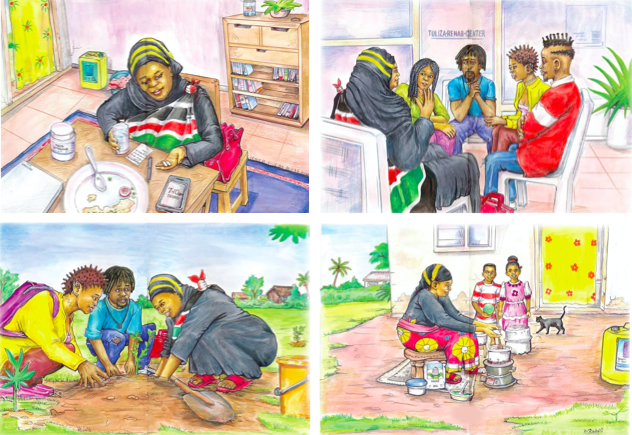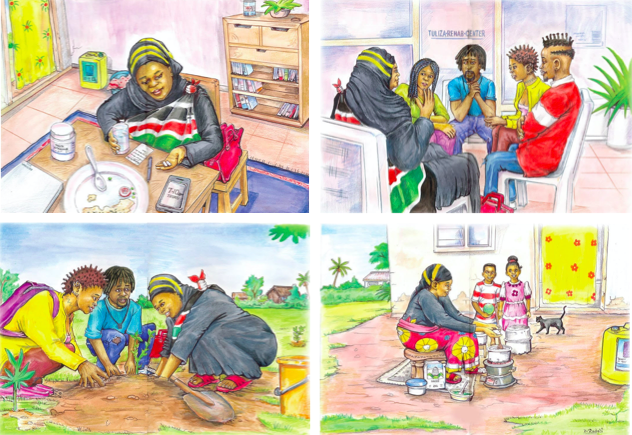What is the Green String Network?
Green String Network (GSN) is an African based organization. We are a network of like-minded individuals and organizations working on developing trauma-informed peacebuilding. We believe that there is a direct link between levels of trauma in vulnerable communities and the challenges faced with justice, reconciliation, security, and overall social wellbeing.
How does your work connect to inner wellbeing and social change?
Violence begins with a thought, yet few interventions focus on the mental wellbeing of at-risk communities, and institutions like the police. GSN concentrates on trauma as a root cause of instability not just a consequence of violence and instability. By connecting our inner wellbeing to issues of social justice and change we believe we are mentally and emotionally preparing those working on issues of violence, neglect, abuse and other difficult issues with a more holistic tool kit.
How do you believe art can be used for social impact?
GSN understands the transformative power of art. We utilize art to depict the experiences of our program participants. In using art as a source of individual reflection and communal dialogue, we strengthen relationships and raise awareness regarding violence, adversity as well as healing practices.
Please tell us about these individual stories that the artists have created.
The artists were given a summary of The Wellbeing Project’s research on “Wellbeing for social entrepreneurs.” From reading the research, the artists developed a set of stories.
The two artists were from Kenya and South Sudan, GSN has worked with both several times in the past.
David Radoli grew up in Mombasa but went to school in Nairobi. He is a graduate of the Technical University of Kenya. Radoli, as he prefers to be called, has been in the media/art industry for over 18 years. He has extensive experience in publishing, advertising, storyboarding and copyrighting. Due to his versatility in arts, he has worked for McCann Erickson, a leading advertising agency. Radoli has a strong preference for working with ink, pen, and watercolors. He has a passion for painting human figures and is an excellent caricaturist.
Deng Majid Chol Deng recalls drawing at home and enjoying pictures in the books at school. He improved his drawing skills initially by copying the picture and was encouraged by his family, who liked his drawings of daily life. Later, he gained a scholarship to study at Nasser University in Tripoli, Libya. It was a totally new environment for him and he was struck by the uniformity of opinions. After initially working using his Chemistry degree, he became connected with The Roots Project in 2011 and now displays his paintings there as well as holding exhibits in other locations.

Above is the story of Mama Fatuma who takes care of others, her family, and herself:
Top Left: Mama Fatuma taking care of her health by taking her dawa as she is anemic.
Top Right: Mama Fatuma at work in a rehab counseling session. She is counseling recovering addicts at a center.
Bottom Left: Mama Fatuma encourages recovering youth addicts into doing productive work. They are tree planting in the neighbourhood.
Bottom Right: Mama Fatuma preparing a meal for her grandchildren after a busy day doing community work. Her lov efor her grandchildren is unimaginable.
What is the value of using artists to communicate on this subject?
An artist interprets a story based on his/her own life experiences. Images which emerge are not prescriptive and allow those who view them, their own interpretations based on their own life experiences. Two people can look at the same painting and each sees a completely different story in the painting.
What is wellbeing for GSN?
Wellbeing is an approach targeting the emotional, cognitive, physical, spiritual and social aspects of the human experience. It is about feeling happy, healthy, socially connected, and purposeful.
Are there any learnings you would like to share with other organizations and communities?
1. Healing is a critical part of stabilization, development, governance, and peacebuilding processes. Finding a way to work through personal pain can support the larger communities healing process.
2. For the leaders of the social change movements, understand that what you experience continues impacting you — your ability to love, show emotions and empathy. Do not let the violence and adversity you are challenging change you to be someone you are not. Take the time for your own self-care and connect to a larger community of changemakers. Take the time you need with your family and other friends. Find joy outside of your work. And be kind and lovely to yourself.
How can people connect with GSN?
Follow our work on our website — we will be starting a new blog shortly about the stories of transformation taking place in our programs.
Or on:
Facebook
Twitter
Instagram


